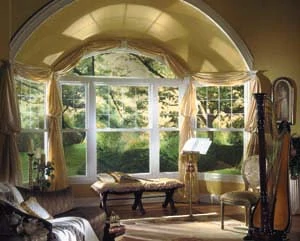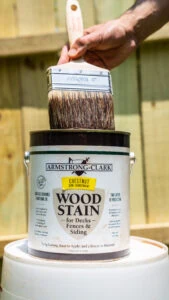Dearly beloved, we join together, in bonded matrimony… gas and glass. For anyone interested in one of the best unions of all times, it’s important to look at the marriage of gas and glass in window and door units.
Why is such a marriage of interest to the average homeowner? Because it can either save them — or cost them — hundreds of dollars each year in heating and cooling pills. The union of gas and glass firmly stand together to block harmful ultraviolet sunrays, a major cause of high-energy costs, faded flooring and condensation buildup.
Homeowners selecting windows and doors for new homes or as replacement units need to fully understand the construction of fenestration products and their potential cost-saving benefits. That’s the advice of Bill Lazor, senior product manager at Simonton Windows.
“In this age of advanced technology, it’s unthinkable and unwise for anyone to have just plain glass in their windows or doors,” says Lazor. “Clear glass offers no protection at all from ultraviolet rays coming into a building that can cause fading of carpets and furnishings. Plus, your heater and air conditioner work harder to keep a structure comfortable when only plain glass is used in windows.”
According to Lazor, the ideal selection for homeowners to select is an IGU (Insulated Glass Unit) made of at least two pieces of glazed or tempered glass sandwiched together and then filled with either an Argon or Krypton gas. The odorless, harmless gases found in the IGUs are denser than air and act as an invisible barrier to prevent damaging UV rays and extreme temperatures from entering a home or building. Similarly, the IGU helps prevent the comfortable, climate-controlled air in the home from escaping to the outdoors.
“If you want to have a highly energy-efficient home, consider glazing and gas options when thinking about your windows,” says Lazor. “Low-E glass is a ‘must’ if you want to maximize the energy efficiency of your windows. Tinted and clear glazings (or coatings) to help prevent the transference of heat, cold, and sunlight into the home. That’s one reason why Low-E coatings are so popular. Gas-filled insulating units, where the invisible gas is hermetically sealed in the window unit using spacer systems, is an excellent barrier. The more barriers that separate the inside of your house from the exterior, the stronger the protection from heat gain or loss.”
Concerned about the idea of having gasses in your windows? Don’t be. The two most popular gas fillers for windows, Argon and Krypton, are odorless and nontoxic. These gasses, when forced into an IGU during the manufacturing process, are carefully sealed so they won’t leak out. The gasses help reduce heat transfer between the glazing layers and the chance for condensation buildup on the interior and exterior of windows.
“Homeowners need to fully understand the construction and options involved with windows before making a major purchase,” says Lazor. “We encourage them to visit a window showrooms or talk to window sales people and specialists. And we encourage them to visit websites such as www.energystar.gov or www.simonton.com. The information gained on these websites is critical in determining which type of windows that will work best in your specific geographic area.”
More on Windows
“Even with their research, homeowners may still have more questions,” says Lazor. “Those we commonly receive at Simonton’s customer service center include:
• How much gas is in the window unit?
• Is the gas in the window flammable?
• How do I know that gas is really in the unit and hasn’t leaked out?
• How long will the gas last in the window?
Answers to these questions usually provide peace-of-mind to homeowners. First of all, during the manufacturing stage, most companies force-fill their IGUs to about 95% full with either Argon or Krypton gas. Second, these gasses are not flammable. They are considered inert noble gasses… just like neon that you’ll find in advertising signs to make them “glow.”
Since the gas in an IGU is colorless, it’s true that a homeowner can not see it with the naked eye. Instead, what they may see if the gas has leaked out and the unit has failed, is that condensation builds up on the interior. This signals that air has gotten inside the unit and replaced the gas. If this happens, the homeowner should contact their window supplier.
Finally we deal with the question of how long the gas lasts in the window. Most major window manufacturers warranty their IGUs for the lifetime of the product as long as you own your home. That means that a warranty is not transferable to new homeowners in many cases. While there is no perfect and positive way to tell how long the gas will last in a window, many companies feel comfortable giving homeowners the estimated timeframe of 35 years for the window to offer energy-saving protection. At that point, after decades of service, the window unit should probably be replaced.



